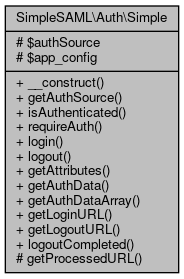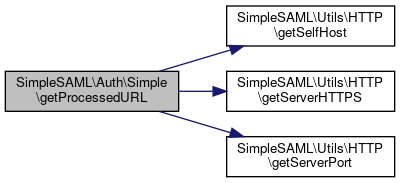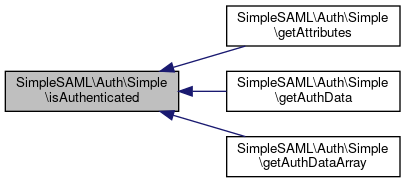 Collaboration diagram for SimpleSAML\Auth\Simple:
Collaboration diagram for SimpleSAML\Auth\Simple:Public Member Functions | |
| __construct ($authSource) | |
| Create an instance with the specified authsource. More... | |
| getAuthSource () | |
| Retrieve the implementing authentication source. More... | |
| isAuthenticated () | |
| Check if the user is authenticated. More... | |
| requireAuth (array $params=array()) | |
| Require the user to be authenticated. More... | |
| login (array $params=array()) | |
| Start an authentication process. More... | |
| logout ($params=null) | |
| Log the user out. More... | |
| getAttributes () | |
| Retrieve attributes of the current user. More... | |
| getAuthData ($name) | |
| Retrieve authentication data. More... | |
| getAuthDataArray () | |
| Retrieve all authentication data. More... | |
| getLoginURL ($returnTo=null) | |
| Retrieve a URL that can be used to log the user in. More... | |
| getLogoutURL ($returnTo=null) | |
| Retrieve a URL that can be used to log the user out. More... | |
Static Public Member Functions | |
| static | logoutCompleted ($state) |
| Called when logout operation completes. More... | |
Protected Member Functions | |
| getProcessedURL ($url=null) | |
| Process a URL and modify it according to the application/baseURL configuration option, if present. More... | |
Protected Attributes | |
| $authSource | |
| $app_config | |
Detailed Description
Definition at line 18 of file Simple.php.
Constructor & Destructor Documentation
◆ __construct()
| SimpleSAML\Auth\Simple::__construct | ( | $authSource | ) |
Create an instance with the specified authsource.
- Parameters
-
string $authSource The id of the authentication source.
Definition at line 38 of file Simple.php.
References SimpleSAML\Auth\Simple\$authSource.
Member Function Documentation
◆ getAttributes()
| SimpleSAML\Auth\Simple::getAttributes | ( | ) |
Retrieve attributes of the current user.
This function will retrieve the attributes of the current user if the user is authenticated. If the user isn't authenticated, it will return an empty array.
- Returns
- array The users attributes.
Definition at line 258 of file Simple.php.
References $session, and SimpleSAML\Auth\Simple\isAuthenticated().
 Here is the call graph for this function:
Here is the call graph for this function:◆ getAuthData()
| SimpleSAML\Auth\Simple::getAuthData | ( | $name | ) |
Retrieve authentication data.
- Parameters
-
string $name The name of the parameter, e.g. 'Attributes', 'Expire' or 'saml:sp:IdP'.
- Returns
- mixed|null The value of the parameter, or null if it isn't found or we are unauthenticated.
Definition at line 279 of file Simple.php.
References $name, $session, and SimpleSAML\Auth\Simple\isAuthenticated().
 Here is the call graph for this function:
Here is the call graph for this function:◆ getAuthDataArray()
| SimpleSAML\Auth\Simple::getAuthDataArray | ( | ) |
Retrieve all authentication data.
- Returns
- array|null All persistent authentication data, or null if we aren't authenticated.
Definition at line 297 of file Simple.php.
References $session, and SimpleSAML\Auth\Simple\isAuthenticated().
 Here is the call graph for this function:
Here is the call graph for this function:◆ getAuthSource()
| SimpleSAML\Auth\Simple::getAuthSource | ( | ) |
Retrieve the implementing authentication source.
- Returns
- \SimpleSAML_Auth_Source The authentication source.
- Exceptions
-
SimpleSAML_Error_AuthSource If the requested auth source is unknown.
Definition at line 54 of file Simple.php.
References $as.
Referenced by SimpleSAML\Auth\Simple\login().
 Here is the caller graph for this function:
Here is the caller graph for this function:◆ getLoginURL()
| SimpleSAML\Auth\Simple::getLoginURL | ( | $returnTo = null | ) |
Retrieve a URL that can be used to log the user in.
- Parameters
-
string | null $returnTo The page the user should be returned to afterwards. If this parameter is null, the user will be returned to the current page.
- Returns
- string A URL which is suitable for use in link-elements.
Definition at line 317 of file Simple.php.
References $returnTo, and SimpleSAML\Module\getModuleURL().
Referenced by SimpleSAML\Auth\Simple\login().
 Here is the call graph for this function:
Here is the call graph for this function: Here is the caller graph for this function:
Here is the caller graph for this function:◆ getLogoutURL()
| SimpleSAML\Auth\Simple::getLogoutURL | ( | $returnTo = null | ) |
Retrieve a URL that can be used to log the user out.
- Parameters
-
string | null $returnTo The page the user should be returned to afterwards. If this parameter is null, the user will be returned to the current page.
- Returns
- string A URL which is suitable for use in link-elements.
Definition at line 342 of file Simple.php.
References $returnTo, and SimpleSAML\Module\getModuleURL().
 Here is the call graph for this function:
Here is the call graph for this function:◆ getProcessedURL()
|
protected |
Process a URL and modify it according to the application/baseURL configuration option, if present.
- Parameters
-
string | null $url The URL to process, or null if we want to use the current URL. Both partial and full URLs can be used as a parameter. The maximum precedence is given to the application/baseURL configuration option, then the URL specified (if it specifies scheme, host and port) and finally the environment observed in the server.
- Returns
- string The URL modified according to the precedence rules.
Definition at line 369 of file Simple.php.
References $base, $path, $query, $url, SimpleSAML\Utils\HTTP\getSelfHost(), SimpleSAML\Utils\HTTP\getServerHTTPS(), and SimpleSAML\Utils\HTTP\getServerPort().
 Here is the call graph for this function:
Here is the call graph for this function:◆ isAuthenticated()
| SimpleSAML\Auth\Simple::isAuthenticated | ( | ) |
Check if the user is authenticated.
This function checks if the user is authenticated with the default authentication source selected by the 'default-authsource' option in 'config.php'.
- Returns
- bool True if the user is authenticated, false if not.
Definition at line 72 of file Simple.php.
References $session.
Referenced by SimpleSAML\Auth\Simple\getAttributes(), SimpleSAML\Auth\Simple\getAuthData(), and SimpleSAML\Auth\Simple\getAuthDataArray().
 Here is the caller graph for this function:
Here is the caller graph for this function:◆ login()
| SimpleSAML\Auth\Simple::login | ( | array | $params = array() | ) |
Start an authentication process.
This function accepts an array $params, which controls some parts of the authentication. The accepted parameters depends on the authentication source being used. Some parameters are generic:
- 'ErrorURL': A URL that should receive errors from the authentication.
- 'KeepPost': If the current request is a POST request, keep the POST data until after the authentication.
- 'ReturnTo': The URL the user should be returned to after authentication.
- 'ReturnCallback': The function we should call after the user has finished authentication.
Please note: this function never returns.
- Parameters
-
array $params Various options to the authentication request.
Definition at line 121 of file Simple.php.
References $_POST, $_SERVER, $as, $params, $returnTo, SimpleSAML\Auth\Simple\getAuthSource(), SimpleSAML\Auth\Simple\getLoginURL(), and SimpleSAML\Utils\HTTP\getPOSTRedirectURL().
Referenced by SimpleSAML\Auth\Simple\requireAuth().
 Here is the call graph for this function:
Here is the call graph for this function: Here is the caller graph for this function:
Here is the caller graph for this function:◆ logout()
| SimpleSAML\Auth\Simple::logout | ( | $params = null | ) |
Log the user out.
This function logs the user out. It will never return. By default, it will cause a redirect to the current page after logging the user out, but a different URL can be given with the $params parameter.
Generic parameters are:
- 'ReturnTo': The URL the user should be returned to after logout.
- 'ReturnCallback': The function that should be called after logout.
- 'ReturnStateParam': The parameter we should return the state in when redirecting.
- 'ReturnStateStage': The stage the state array should be saved with.
- Parameters
-
string | array | null $params Either the URL the user should be redirected to after logging out, or an array with parameters for the logout. If this parameter is null, we will return to the current page.
Definition at line 181 of file Simple.php.
References $as, $params, $session, $state, and SimpleSAML\Auth\Simple\logoutCompleted().
 Here is the call graph for this function:
Here is the call graph for this function:◆ logoutCompleted()
|
static |
Called when logout operation completes.
This function never returns.
- Parameters
-
array $state The state after the logout.
Definition at line 230 of file Simple.php.
References $params, $state, and SimpleSAML\Utils\HTTP\redirectTrustedURL().
Referenced by SimpleSAML\Auth\Simple\logout().
 Here is the call graph for this function:
Here is the call graph for this function: Here is the caller graph for this function:
Here is the caller graph for this function:◆ requireAuth()
| SimpleSAML\Auth\Simple::requireAuth | ( | array | $params = array() | ) |
Require the user to be authenticated.
If the user is authenticated, this function returns immediately.
If the user isn't authenticated, this function will authenticate the user with the authentication source, and then return the user to the current page.
This function accepts an array $params, which controls some parts of the authentication. See the login() method for a description.
- Parameters
-
array $params Various options to the authentication request. See the documentation.
Definition at line 93 of file Simple.php.
References $params, $session, and SimpleSAML\Auth\Simple\login().
 Here is the call graph for this function:
Here is the call graph for this function:Field Documentation
◆ $app_config
|
protected |
Definition at line 31 of file Simple.php.
◆ $authSource
|
protected |
Definition at line 26 of file Simple.php.
Referenced by SimpleSAML\Auth\Simple\__construct().
The documentation for this class was generated from the following file:
- libs/composer/vendor/simplesamlphp/simplesamlphp/lib/SimpleSAML/Auth/Simple.php
















